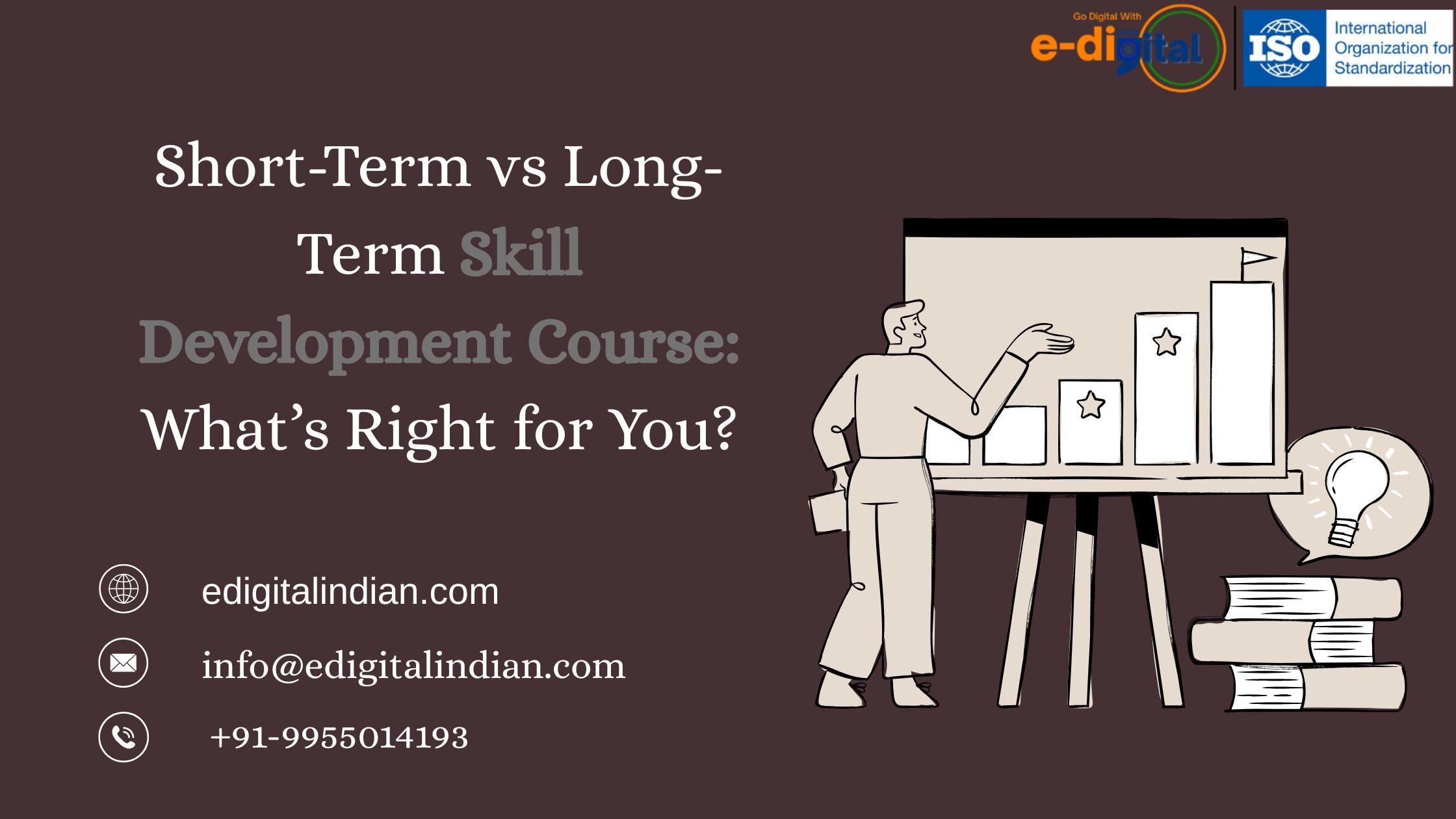Introduction
In today’s digital-first world, digital marketing is no longer just a buzzword — it’s a critical career skill. From SEO and social media to paid advertising and email marketing, businesses of every size need digital marketing experts to grow and succeed. But if you're looking to break into this dynamic field or upgrade your skills, you’re likely faced with one big question:
Should you go for a short-term or a long-term skill development course in digital marketing?
Both options have their benefits and drawbacks, and your choice should depend on your goals, current knowledge level, and career aspirations. In this blog, we’ll break down the differences and help you decide which path is right for you.
Understanding Short-Term Digital Marketing Course
Courses that are short in duration are meant to be effective, focused, and practical. These programs usually run from a few days to 3 months, covering specific skills or tools within digital marketing.
Common Features:
-
Duration: 1 week to 3 months
-
Mode: Online or Offline
-
Focus: Specific areas like SEO, Google Ads, Facebook Marketing, or Content Writing
-
Ideal for: Beginners, working professionals, and freelancers
Benefits of Short-Term Courses:
-
Quick Skill Building: Learn a particular tool or technique in a short time.
-
Affordable: These are usually budget-friendly platforms like Edigital Indian.
-
Flexible: Great for those who want to upskill without leaving their job.
-
Instant Application: Perfect for freelancers or entrepreneurs who want to use digital marketing immediately for their business.
Limitations:
-
Narrow Focus: You might miss the bigger picture of digital marketing strategy.
-
No Deep Dive: Limited time means limited depth.
-
Fewer Job Opportunities: Employers may prefer candidates with more comprehensive knowledge or certifications.
Understanding Long-Term Digital Marketing Courses
Long-term courses offer a comprehensive curriculum. These programs typically last 3 months to 1 year and cover every aspect of digital marketing in detail.
Common Features:
-
Duration: 3 months to 1 year
-
Includes: SEO, SEM, Social Media Marketing, Email Marketing, Analytics, Influencer Marketing, E-commerce, and more
-
Includes Projects, Case Studies, Internships
-
Ideal for: Career changers, fresh graduates, job seekers, and business owners
Benefits of Long-Term Courses:
-
Holistic Learning: Understand how different channels work together in a marketing strategy.
-
Hands-on Experience: Most programs include live projects, tools, and even internships.
-
Certifications & Placements: Many institutes offer ISO/MSME certifications and placement support.
-
Career-Ready: You’ll be prepared for roles like Digital Marketing Executive, SEO Analyst, or Social Media Manager.
Limitations:
-
Time-Consuming: You need to commit significant time and energy.
-
Higher Cost: More expensive than short-term courses.
-
Not Ideal for Just One Skill: If you only need one or two specific skills, a long course may be too much.
Side-by-Side Comparison
| Feature | Short-Term Course | Long-Term Course |
| Duration | 1 week – 3 months | 3 months – 1 year |
| Cost | Low to Medium | Medium to High |
| Depth | Basic to Intermediate | Intermediate to Advanced |
| Best For | Specific skill development | Comprehensive career change |
| Flexibility | High (often self-paced) | Moderate (structured schedule) |
| Career Impact | Limited but useful for freelancers or entrepreneurs | Strong foundation for full-time roles |
How to Choose the Right Course for You?
Consider the following questions to aid in your decision-making:
1. What is Your Goal?
-
Want to learn how to run Facebook ads for your own business?
-
Are you looking to obtain a job as a qualified digital marketer?
2. How Much Time Can You Commit?
-
Can only study weekends or evenings?
-
Can dedicate several months to learning and internships?
3. What’s Your Current Knowledge Level?
-
Already know basics, just want to learn SEO?
-
Starting from scratch?
4. Do You Need Certification?
-
Some certifications are short-term and highly valued.
-
But for a professional career path, institute-backed certifications with practical training matter more.
Which Option Do Employers Prefer?
Employers frequently favor applicants with a wide understanding of digital marketing. This is more likely in those who’ve completed a long-term course with practical experience and certifications.
However, if you can show a strong portfolio and results from short-term learning, even short courses can lead to freelance gigs, internships, or entry-level jobs.
Note: If you want to become a digital marketer in just 6 months. Click Edigital India
Conclusion
Whether you choose a short-term or long-term digital marketing course, remember that real growth comes from consistent practice, experimentation, and learning.
If you’re testing the waters, go for a short-term course to get your feet wet.
If you’re serious about building a career, a long-term, structured program will give you the best foundation.
No matter the duration, what counts the most is your commitment to applying what you learn.



